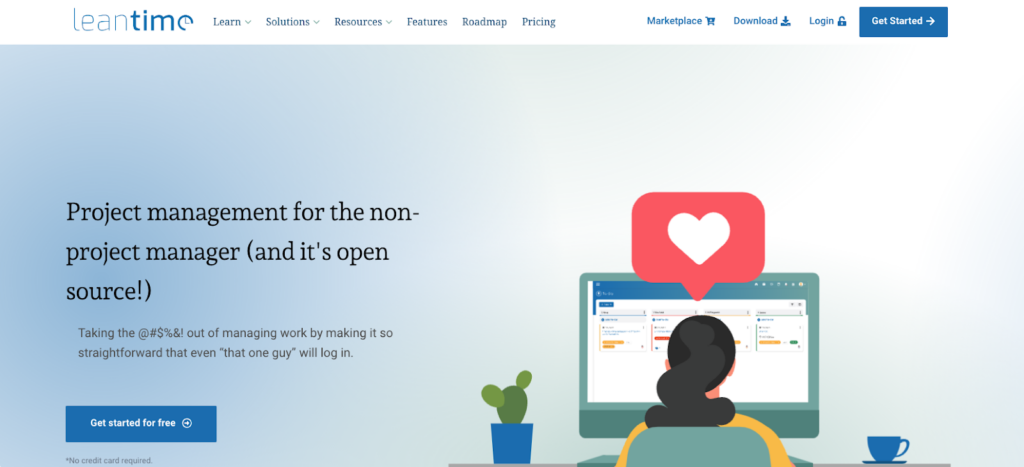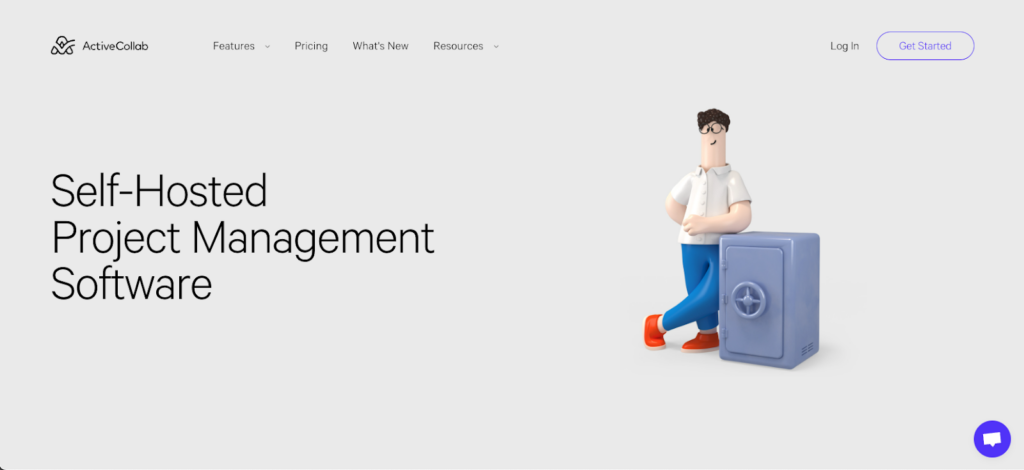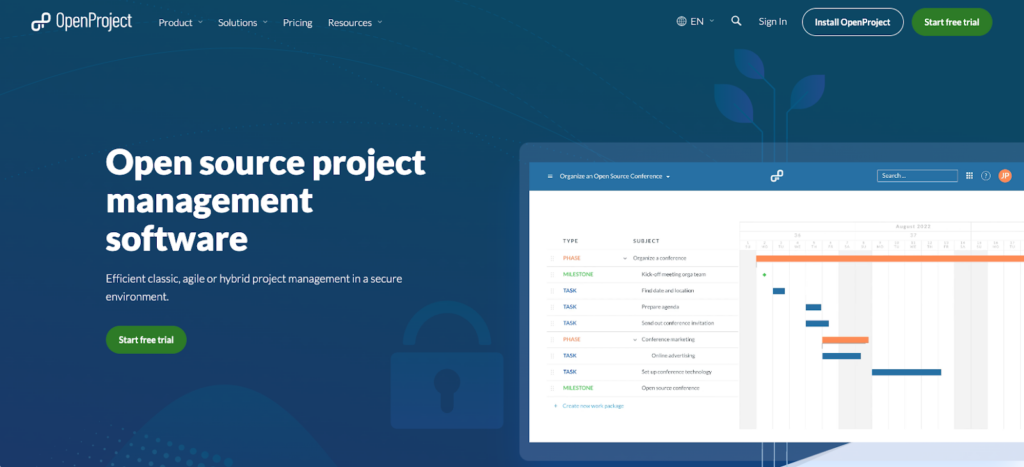Estimated reading time: 12 minutes
Table of contents
- Importance of project management tools in modern enterprises
- Overview of on-premises solutions and self-hosting
- Introducing Leantime as a self-hostable project management tool
- What is Self-hosting and On-premises Solutions
- Benefits of Self-Hosting Project Management Tools
- Popular Self-hostable Project Management Tools
- Setting Up Self-Hosted Project Management Software
- Managed self hosting
- Leantime: A Comprehensive Self-Hosted Solution
- Conclusion
Importance of project management tools in modern enterprises
Project management systems play a vital role in enabling enterprises and companies to achieve their business goals. These work management tools can provide a platform to that allows team members to work together in order to effectively plan, organize, and ultimately, control various aspects of projects. This can include scheduling tasks, assigning resources, monitoring progress, and measuring performance.
By facilitating this work and team coordination, the project management apps can help to create visibility, maintain budgets, mitigate risks and monitor the tasks required to reach a plan.
Deploying such systems brings key benefits like improved productivity, cost control, resource optimization, accountability, and data-driven decision making.
Given today’s dynamic business landscape, adopting a centralized project management system is crucial for companies seeking to execute strategy and fuel growth in a scalable way while delighting customers. The right solution empowers leaders to successfully govern portfolios and drive innovation.
Overview of on-premises solutions and self-hosting
Challenges can begin to arise for organizations, however, that are responsible for secure, private and high risk data information. In this situation, it is important for companies to consider how to best manage this data and whether or not they want to put rely on cloud based platforms to manage this risk.
On-premises solutions and self-hosting offer enterprises control over their data, customization, and integration. They differ from cloud-based solutions, which may have limitations in these areas.
Even if you are not concerned about data management, you may be working in an environment that requires stable offline access. Managing work details at the time of the work is absolutely vital to ensure that it is managed and tracked correctly. By failing to have an accessible tool, the risk of teams inputting data incorrectly will go up.
In this situation, the best solution for an organization to consider is on premise or self hosted project management. The best places to access this is within open source software that give organizations more flexibility and control over their own personal data management.
Lastly, other reasons to consider on premise software solutions include an opportunity to better manage software as a service costs, subscription costs, and general overhead. While open source software is not inherently free (someone is still developing the software), there is important flexibility with many of the tools that allows you to have better control over both your data and your costs.
Introducing Leantime as a self-hostable project management tool
Leantime is an open-source project management tool that is ideal for self-hosting and on premise installation models. It provides businesses with the flexibility and control they need to succeed in today’s dynamic environment.
The on premise version of Leantime includes more free project management features than many of the other tools out there including:
- Document or Wiki Management
- File Management
- SSO (Single Sign-On)
- Strategy Boards
- SWOT (Strengths, Weaknesses, Opportunities, and Threats)
- Lean Model Canvas
- Business Model Canvas
- Idea Management
- Innovation Management
It also allows client management, time tracking from tasks and has an active and responsive discord community.
Where Leantime Differs
Where we ultimately differ, however, is in its behavioral science and motivational psychology-driven approaches to work management. Rather than having to think about how you set up the tool, it’s clear where your work should be done and the tool is straightforward to use.
Simple, however, does not mean that it is not feature-rich and you can still run traditional agile sprints and work out of it. In it’s simplicity, however, Leantime has created a tool that is now accessible to non-development teams and the other members who may not traditionally use other tools your organization has used.
As Leantime grows, they have their sights on using AI and these science-based approaches to make work more relevant to the team members, to help them see the impact that their work makes and to help teams and organizations work more deliberately towards their goals. If you are looking for something beyond task management and want to optimize productivity and success, Leantime should be on your list to consider.
Leantime is also in the process of developing its plugin marketplace, which allows its cloud-based premium features such as whiteboard, AI, strategy management program management/portfolio management, and more to add even more features to your work management success.
What is Self-hosting and On-premises Solutions
Self-hosting and on-premises solutions refer to the installation and management of software on a company’s own servers, as opposed to relying on external, cloud-based services. This approach provides businesses with greater control over their data, software customization, and integration with existing systems.
Definition of Self-hosting and On-premises Software
Self-hosting is the process of running and maintaining software on an organization’s own hardware and infrastructure. On-premises solutions, on the other hand, refer to software that is installed and operated within a company’s physical premises rather than being hosted by a third-party provider.
Both self-hosting and on-premises solutions allow enterprises to manage their software applications and data in-house, providing enhanced security and control. As mentioned in the overview, self-hosting software ultimately creates greater autonomy in costs, security, and data management for organizations.
Comparison with Cloud-based Solutions
Cloud-based solutions are hosted on external servers and typically provided as a service by third-party vendors. While cloud-based services offer scalability, ease of use, and lower upfront costs, they may not provide the same level of control, customization, and data security as self-hosted and on-premises solutions.
By opting for self-hosting or on-premises software, businesses can ensure full control over their data, tailor the software to their specific needs, and seamlessly integrate it with their existing systems.
Benefits of Self-Hosting Project Management Tools
Self-hosting project management tools offers numerous advantages for businesses, including enhanced data control, customization, cost savings, and improved performance. Let’s explore these benefits in more detail.
Data Control and Privacy
One of the main benefits of self-hosting project management tools is enhanced data security. By keeping data on your own servers, you can ensure compliance with internal data security policies and better protect sensitive information. This level of control is particularly important for organizations with strict data privacy requirements or those handling sensitive client information.
Customization and Integration
Self-hosting project management tools allow businesses to make in-house code modifications and seamlessly integrate the software with their existing systems. This flexibility enables organizations to tailor the tool to their specific needs and processes, ensuring a more efficient and streamlined project management experience.
Cost Considerations
Self-hosting project management tools can provide significant cost savings for businesses. Organizations can reduce their overall project management software costs by controlling infrastructure expenses and avoiding recurring subscription fees associated with cloud-based solutions.
Latency and Internet Dependency
By hosting project management tools on-premises, businesses can benefit from faster response times and reduced reliance on internet connectivity. This can be especially beneficial for organizations with limited bandwidth or those operating in areas with unreliable internet connections.
Long-term Availability and Intellectual Property
Self-hosting project management tools offer the advantage of long-term availability, as businesses are not dependent on vendor support or the continued existence of a specific software provider. Additionally, self-hosting allows organizations to maintain ownership of their software and any customizations they have made, ensuring full control over their intellectual property.
Popular Self-hostable Project Management Tools
There are several self-hostable project management tools available that cater to a wide range of business requirements and preferences. Let’s explore some of the popular options:
Leantime

Leantime is an open-source project management tool designed for various target audiences. It is committed to on-premises solutions, ensuring businesses can benefit from its powerful features without compromising control and security.
Leantime is built with inclusivity in mind, catering to individuals with ADHD, ADD, and dyslexia by offering features that boost dopamine and intrinsic motivation, as well as utilizing research-based design for easy reading.
Active Collab

Active Collab, while not open source, is another self-hostable project management software. For more information on their costs, you’ll need to reach out to their sales teams. Its popularity and wide usage reflect its efficiency and effectiveness in managing projects across various industries.
OpenProject

OpenProject is a popular open-source project management software that supports Classic, Agile, and Hybrid management styles. This versatility allows organizations to tailor their project management approach to their unique needs and preferences, ensuring optimal outcomes for projects of all types and sizes.
Setting Up Self-Hosted Project Management Software
Setting up self-hosted project management software requires planning and execution. Here are the key steps to ensure a smooth setup process:
Determine your organization’s needs
First, it is essential to determine your organization’s needs and requirements. This includes identifying the specific features and functionalities required for your projects, as well as any security or compliance considerations that must be addressed.
Find the right project software
Next, choose the right software that aligns with your needs and offers the desired level of customization and integration. Popular options include Leantime, Active Collab, and OpenProject. When selecting the software, consider factors such as ease of use, scalability, and support from the provider.
Once the software has been chosen, prepare the necessary infrastructure to support the self-hosted solution. This may involve setting up servers, storage, and networking components, as well as ensuring adequate security measures are in place to protect your data and systems.
Install the software and connect with the product’s support
With the infrastructure in place, you can proceed to install the project management software. Follow the provider’s installation instructions and ensure all necessary components are correctly configured for optimal performance.
After the installation is complete, configure and customize the software to suit your organization’s needs and processes. This may involve setting up user accounts, permissions, and workflow templates, as well as integrating the tool with other systems and applications used within your organization.
Security is a critical aspect of any self-hosted solution, so be sure to strengthen security measures to protect your data and systems. This may include implementing firewalls, encryption, and access controls, as well as regularly monitoring and auditing your environment for potential vulnerabilities.
Managed self hosting
Depending on the size of your organization, one of the larger challenges with on premise software is the maintenance of regular updates. Systems like Leantime offer a managed self-hosting approach. In situations where you do not have the team to manage regular updates, Leantime can come in and ensure updates and transitions are smooth while your company manages the server and data.
Maintaining regular updates is crucial to ensure your project management tool remains current and secure. Schedule routine updates and patches to address any security concerns, improve functionality, and stay up-to-date with industry best practices.
Preparing backup and disaster recovery protocols is essential to safeguard your data and ensure business continuity in the event of system failure or data loss. Develop a comprehensive backup and recovery plan that includes regular data backups, offsite storage, and a clear process for restoring lost or damaged data.
Finally, launch the self-hosted project management tool and onboard your team. Provide the necessary training and support to help team members become familiar with the new software and ensure a seamless transition to the self-hosted solution.
Leantime: A Comprehensive Self-Hosted Solution
Leantime offers a complete and feature-rich project management solution for businesses that prefer to self-host their tools. Designed with the needs of various target audiences in mind, Leantime provides a wide range of features and tools that make project management efficient and seamless.
Features and Tools Offered by Leantime
Leantime boasts an array of features that cater to different project management requirements, such as Kanban boards, project dashboards, and Gantt charts. These tools enable teams to visualize their work progress, plan their roadmaps, and manage tasks more effectively. Additionally, Leantime offers communication, roadmap planning, and task management tools that foster collaboration and keep team members on the same page.
Reporting and timesheets are also crucial components of Leantime’s offering. These features allow teams to track their work hours, monitor project progress, and make data-driven decisions to improve efficiency and productivity.
Pricing Plans and Support
Leantime offers a variety of pricing plans, including a free plan and paid plans with different features. This flexibility ensures that businesses can choose the most suitable plan based on their needs and budget. In terms of security, Leantime adheres to GDPR and CCPA regulations and provides two-factor authentication, ensuring the protection of users’ data.
Furthermore, Leantime is committed to delivering excellent customer support. Users can reach out to the support team via email or Discord for assistance with any issues or questions they may have. By choosing Leantime as their self-hosted project management solution, businesses can rest assured that they will receive a comprehensive, secure, and well-supported tool to manage their projects effectively.
Conclusion
In conclusion, self-hosting project management tools offer a range of significant benefits for businesses, including:
- Enhanced Data Control and Privacy
- Greater Customization and Integration Possibilities
- Cost Savings
- Improved Performance
By choosing a self-hosted solution like Leantime, organizations can enjoy a powerful and flexible project management tool while maintaining full control over their data and systems.
As you go to select a project management system to use, either on premise or otherwise, Leantime offers a unique opportunity as self-hosted and cloud solution for both project management and team engagement needs.
With its wide array of features, commitment to on-premises solutions, and excellent customer support, Leantime is a reliable and effective choice for organizations looking to optimize their project management processes and achieve greater success in their projects.
Unlock Your Project Potential
As we’ve explored, self-hosting project management tools like Leantime offer numerous benefits, including enhanced data control, customization options, and cost savings. Leantime is designed to cater to various target audiences and is built with a focus on inclusivity, making it an excellent choice for teams of all sizes and backgrounds.
- Download Leantime
- Explore Leantime features
- Learn more about Leantime’s strategic execution
- Discover Leantime as a Jira Data Center alternative
Take control of your project management processes and unlock the full potential of your team with Leantime’s self-hosted solution.



